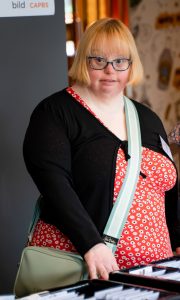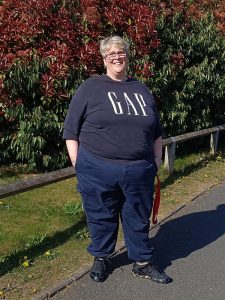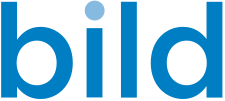NEWS
All the latest news and views from Bild.
16 June 2025
Learning Disability Week 2025
It’s Learning Disability Week 2025! This is an opportunity to uplift the voices of people with learning disabilities and celebrate the progress we have made towards a more inclusive society.
It’s also a time of year to think about what still needs to be done to help people with learning disabilities be seen and have their voices heard.
We spoke to Bild for the Future to find out what they would like to do for Learning Disability Week this year. They said that they would like to share their thoughts on what Learning Disability Week means to them in their own words, and we’re pleased to share what some of them had to say below.
This interview includes responses from Kate Brackley (Learning Disability Advisor and co-Chair of Bild for the Future), Sal (Bild for the Future) and Stuart.
What does Learning Disability Week mean to you?

Kate: Learning Disability week means a lot to me as it affects me and millions of people who have learning disabilities. We are part of the world and we are all unique in every way and it makes me feel so proud.
Sal: Learning Disability Week is a time to recognise and celebrate people with learning disabilities. It is a week to feel proud of who we are. Having a learning disability doesn’t mean you can’t live a good, normal life. I do a lot of work with BILD, and I am very passionate about it. I speak up for people with learning disabilities. You can still reach your goals — it might just take a little more time, and that’s okay.
Stuart: Learning Disability Week is about awareness and understanding. It helps people learn more about learning disabilities. But awareness is not enough on its own — we also need acceptance. Awareness and acceptance go hand in hand. You can’t have one without the other. They are both important, and they are linked.
Can you share something that has got better for people with learning disabilities?

Sal: I think people with learning disabilities are living longer now, and that is a good thing. Having a yearly health check is really important. You are entitled to one, so make sure you get it! Things are better, but we’re not fully there yet. We need to keep speaking up and keep making life better for everyone with a learning disability.
Kate: I think that one thing that has got better for people with learning disabilities is that our voice is much stronger now. We are really starting to get people to notice us a lot more. It does need to get better but it’s getting there.
Stuart: Sometimes it feels like two steps forward and one step back. People are trying, and I think things have got a little better. There is more awareness now, but it’s happening slowly. Self-advocacy groups are doing their best — speaking up and making change. It can be a slow process, but we are moving in the right direction.
Can you share something that still needs to get better for people with learning disabilities?
Stuart: There is still a lot that needs to get better. Accessibility and reasonable adjustments are important. It’s not just about physical things like ramps. It’s also about the environment and how people are treated. Some people think disability only means a wheelchair or a ramp — but it’s more than that. We need society to understand learning disabilities better and make changes that help everyone feel included.
Kate: I think that we should be still thinking about things to improve our rights more, as people are not realising that our rights should be for everyone including people with learning disabilities. We have one big voice and we should be heard, especially when it come to our basic human rights.
Sal: Some things still need to change. Activities in the community can cost too much. They need to be more affordable, because these activities are important for people with learning disabilities. Support in supported living or care packages also needs to be better. Sometimes there are not enough staff, or staff don’t have enough time — and that’s not fair. Health checks from doctors need to improve too. Doctors must understand how important these checks are for people with learning disabilities. We still have work to do, but speaking up can help make things better.
What makes you feel seen as a person with a learning disability?
Kate: I think that I feel more included as someone with a learning disability as it shows me as unique and somebody who sees me for who I am, not someone who thinks that I am different. I have a life where I am included in every way and being supported to make my own choices and decisions by myself, and yes I am proud of myself for the way I live my life to the full.
Sal: I don’t wear a label — that’s for sure! I try to be as independent as possible. People see me for who I am, not just my learning disability. That’s what makes me feel seen and respected.
Stuart: Sometimes, people see you in ways you don’t want to be seen. They might not think you’re just having a bad day — they see your disability first. But feeling truly seen is about more than just being looked at. Being part of the community helps — but only if you are accepted, valued, and involved. It’s easy to have someone sit in a room, but if they’re not included, what are they really doing there? B![]() eing seen means being listened to. It means your voice matters. You might have heard the saying, “Seen but not heard” — often said to children. People with learning disabilities can be treated like that too. It feels demoralising and knocks your confidence. Feeling seen means people treat you with respect, listen to you, and involve you.
eing seen means being listened to. It means your voice matters. You might have heard the saying, “Seen but not heard” — often said to children. People with learning disabilities can be treated like that too. It feels demoralising and knocks your confidence. Feeling seen means people treat you with respect, listen to you, and involve you.
If you’d like to see the work that other people and organisations are doing for Learning Disability Week, search #LDWeek2025 or #LearningDisabilityWeek2025 on your favourite social media sites! You can share the work you’re doing through the same hashtag.
